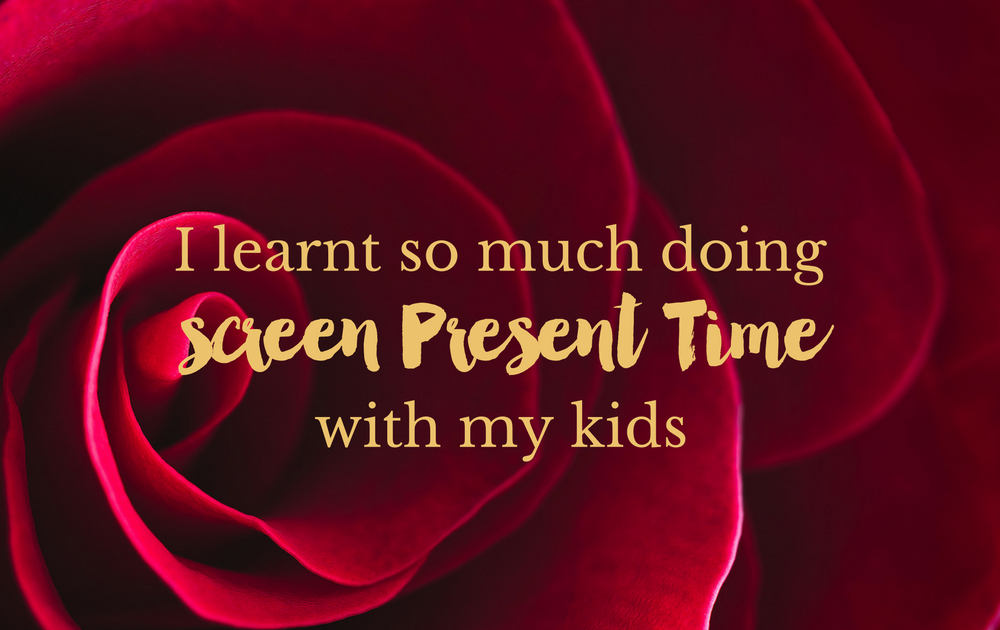Hello!
Thank you for all the replies I received to my email yesterday. Lots of you said things about my last comment, about how much I charge for my courses.
As I was driving along yesterday, a neon sign suddenly shone, “Be aware of your blind spots!”
Yesterday I shared a process whilst I was still in the middle of it – and I felt really vulnerable when I realised that I wasn’t seeing a blind spot and that many of you had.
But to me, that is what intimacy is – not always just sharing when everything is done and dusted and the learnings are are clear and the blind spots seen – but also sharing in the middle, when the dust is swirling and the clarity is yet to come.
What I loved was that in the past I would have judged myself and would have felt huge shame.
Yesterday I set loving limits with self-judgment, and my Inner Loving Mother gave me compassion for the feeling of discomfort I was feeling.

I want to share a different experience with you today.
Yesterday, I did screen Present Time with my kids.
Screen Present Time is like Present Time, where we set the time and then we follow their lead for that amount of time. But with screens.
We used to screen PT regularly, but we haven’t done any for ages – they haven’t asked and I haven’t offered!

A couple of days ago my son said he wanted to do some screen PT, so we decided on yesterday.
He had found a new screen game that he was enjoying, and wanted for us all to play together.
So, the three of us all sat together and each logged in to our accounts. We were in a ‘map’ of parkour, where we needed to go through different challenges to get to each new level. Each person could see where the other person was on the map.
As soon as we started, I could see the power-reversal in action. (Power-reversal games are a type of attachment play that Aletha Solter, founder of Aware Parenting, talks about, where the child has the power and we don’t.)

The whole experience was incredibly eye-opening.
Of course they were both incredibly competent, and I was incredibly not!
My daughter (14), who was way ahead of me, suddenly became this amazingly encouraging, supportive, influence.
When I started to feel frustrated, or wanted to give up, she was saying, “You can do it, Mum!” and every time I did do something, she would celebrate me with such warmth and love. This went on for HOURS!

And my son (10). Well, a side came out that I hadn’t seen since last screen PT.
He stayed close to me in each level and helped me through every single thing. He was calm. He was empathic. He helped me both emotionally and tactically with each step.
As it got harder, and I got increasingly frustrated, he took more and more action to help me. He offered to “die” in the game so that I could use his dead body as a bridge! He spent a long time working out ‘cheats’ so that I would actually be able to do it. He went around the whole game to get to the next level so he could bring back bridges to help me. He basically spent the WHOLE time in the game just being there to help me.
I know this sounds funny, but in seeing how they responded to me, in that power-reversal situation where they knew everything and I knew nothing, gave me a sense of deep recognition of what I’ve done as a mother for them.

I also really got to experience what their experience is during playing a game like that.
I mentioned yesterday about the flow process. And about a year ago, I’d read about how some computer games really help induce a state of flow.
Csikszentmihalyi talks about how flow happens when there is a balance between the difficulty of a task and the time available to perform that task, and when the task requires high levels of creativity, is extremely motivating, and provides immediate feedback.
In moments when I wasn’t falling off something in the game, I found myself in a deep level of concentration and flow. It helped me remember that when I ask my children to get off screens, that what is most helpful is to first check in with them and what they are doing, so I understand, and can take into account, what is going on for them emotionally.

What did I learn and remember through doing screen PT?
That power-reversal games and PT are incredibly powerful. I got to experience what they regularly experience, and so to have much more understanding and compassion for them.
That when I am in their world, they have the opportunity to give me support, encouragement, and play the role of the guide and facilitator.
I got to experience how compassionate they are.
They had the opportunity to contribute to me.
They got to have their experiences valued and understood.

I also remembered why I can avoid PT at times, and I thought you might find this helpful, because I often hear from parents about wanting to avoid PT and power-reversal games.
1. I didn’t set a timer, which I generally recommend for PT. We had a rough plan for 30-40 minutes, but once we got into the game, they wanted me to finish the WHOLE game, which took more than 2 hours!
2. That helped stroke a powerlessness sweet spot in me, because as things got more and more challenging, I didn’t have that container of choice that really helps as parents when we agree on a set time beforehand.
3. My daughter very clearly didn’t want Sunny to actually get on my keyboard to do things for me. And because she didn’t want that, he wouldn’t do it for me!
4. The combination of the time being so long, my intense frustration at keeping on doing something that was SO challenging for me, their loving support, and her loving limit around ‘not cheating’ as she put it, meant that at the end I was in a big sweet spot.
5. I connected with being a 15 year old at school and being in maths class after maths class, where I was given things that I found really challenging, but not given the support to actually DO it. I had felt SO powerless and frustrated at that time. I went in with my Inner Loving Presence Process and heard my 15 year old self’s feelings, and her longing for CHOICE and SUPPORT.

Present Time and power-reversal games CAN stir up our own feelings of powerlessness from younger days, when we DIDN’T get to choose what we were doing.
There are a few things that we can do to help yourself with that:
1. Make sure we give ourselves Present Time before we offer it to our child – that means connecting with ourselves, discovering what we want to do, and giving ourselves a chunk of time to be really present whilst we do that. It might be 10 minutes doing yoga, or sitting on the warm deck drinking a smoothie, or anything – the important parts are SELF-CONNECTION, CHOICE and PRESENCE.
2. Setting the timer on starting PT. That means we have created the container for choice, which means within that time, we are very likely to be able to easily follow their lead and give them all the power, because we have made the initial time container choice.
3. If powerlessness feelings DO come up for us, however uncomfortable, we can respond to them compassionately, which is going to be helpful for us and our children. In what way might that be helpful?
Well, it’s helpful for our children because we get to experience what they experience more regularly, because they have less power in our culture. Even if we do everything we can to give them choices, as they are learning and growing they are way more likely to experience powerlessness.
And it’s helpful for us, because in listening to those younger parts of us with compassion, we get to heal from our own experiences of powerlessness, and we get to invite yet another part of us into the fold of ourselves.

Even if you child doesn’t play computer games, I hope you found this helpful – all of this can be translated to whatever your child is into.
Entering their world, letting them be the guide and facilitator, doing PT and power-reversal games, all of these can help us understand our children more, so that we can be more empathic and compassionate and respond in the most helpful ways.

And I love that this has come up now, because I’m planning on doing another live round of my free Powerful Present Time Practice mini course in about 10 days! I’ll let you know about it soon!

So, I’d love to ask you:
Do you find yourself avoiding Present Time with your child?
If so, does giving yourself PT first and setting a timer help you do it more often?
Have you ever done screen PT with your child, and if so, what happened?
Do you ever connect with your own powerlessness sweet spots when you do PT or power-reversal games?
If so, would you like to go in and listen to that younger you with deep compassion and love?
Love,
Marion
